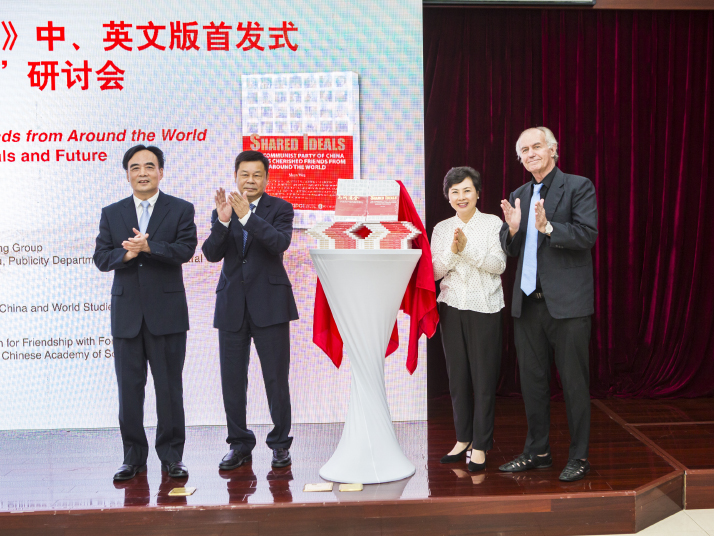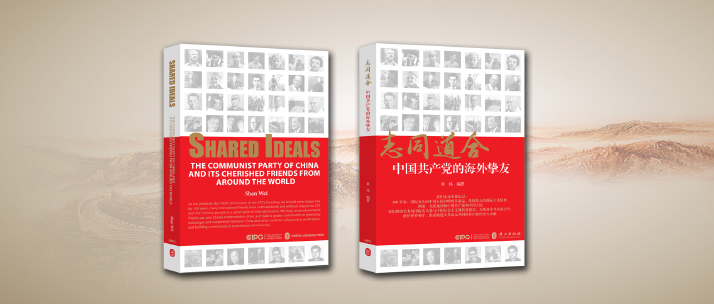| Lifestyle |
| New book pays tribute to the Party's international friends | |
|
|
 The book Shared Ideals: The Communist Party of China and Its Cherished Friends From Around the World is unveiled on July 23 (COURTESY PHOTO)
The Olympic Summer Games Tokyo 2020 concluded on August 8, and China took home a grand total of 38 gold medals and 88 medals, ranking second in the medal tally. When speaking of China's Olympic performance, one individual deserves some extra recognition. That is Juan Antonio Samaranch, the Seventh President of the International Olympic Committee (IOC) and the man who supported China to resume its legitimate seat on the IOC as well as its bidding for the Olympic Summer Games Beijing 2008. In 1954, the People's Republic of China (PRC) for the first time ever obtained a spot on the IOC. Nevertheless, only two years later, then IOC President Avery Brundage advocated assigning Taiwan a legal seat, thereby supporting the "two Chinas" conception. In response, the Chinese Government refused to participate in the 16th Olympic Games in Melbourne, Australia, and further announced it would terminate all ties with the IOC. Things began to change when Brundage stepped down in 1972. Late Chinese leader Deng Xiaoping proposed to restore China's legal seat on the IOC in 1974 and in April 1978, Samaranch visited China as the committee's first vice president. He carefully studied Chinese history and cross-Taiwan Straits relations. He said, "The IOC has no reason to reject a large country with a population of 1 billion. China is one big family. Anyone attempting to divide it will eventually fail." On account of his efforts, China's application to rejoin the IOC was passed in 1979. This achievement is inseparable from Samaranch's understanding and support of the Communist Party of China (CPC)'s concept of governance. Samaranch's friendship with China was captured in a new book entitled Shared Ideals: The Communist Party of China and Its Cherished Friends From Around the World recently published by the Foreign Languages Press (FLP). The book selects 18 representative international friends of the CPC from different historical periods and geographical areas as well as of various professions. That includes famous American writer and journalist Edgar Snow, whose representative work Red Star Over China tells the stories of the CPC and its leaders; and Indian doctor Dwarkanath Kotnis who worked as a surgeon for the CPC-led Eighth Route Army during the Chinese People's War of Resistance Against Japanese Aggression (1931-45). "As we celebrate the 100th anniversary of the CPC, we won't forget that there has been such a group of international friends who have shared weal and woe and forged a lasting friendship with the Party as well as made important contributions to the just cause of the Chinese people," Du Zhanyuan, President of China International Publishing Group of which FLP is a subsidiary, said at the book launch on July 23. "Through the publication of this book, we want to pay our highest respects to the international friends who have made indelible contributions to China's revolution, construction, reform and renewal causes," Du added.  Both the Chinese and English versions of Shared Ideals: The Communist Party of China and Its Cherished Friends From Around the World (COURTESY PHOTO)
A new perspective The legendary life of George Hatem, the first foreigner to become a Chinese citizen, too, is featured in the book. Known as Ma Haide in China, Hatem was an expert in the treatment of venereal and skin diseases as well as in the containment of leprosy. Born into a Lebanese American family in Buffalo, New York, in 1910, Hatem came to Shanghai to study endemic diseases after obtaining a master's degree from the University of Geneva. In Shanghai, he met Soong Ching Ling—widow of Dr. Sun Yat-sen, a forerunner of the Chinese revolution—together with a group of foreigners sympathizing with China's communist revolution, including the likes of American journalist and activist Agnes Smedley. Under their influence, he began to devote himself to a range of revolutionary activities. The clinic he opened in Shanghai became the liaison station of the CPC's underground organization. In 1936, he traveled to Bao'an in Shaanxi Province, the seat of the CPC Central Committee at that time, to help establish medical institutions. Through field trips to the Red Army's hospitals both on the front and in the rear areas, he compiled the Report of the Medical and Health Work in Soviet Areas, suggesting to reinforce medical services in the areas. CPC leader Mao Zedong later appointed him as a health consultant to the CPC Central Military Commission and Hatem officially joined the CPC in 1937. After the founding of the PRC, Hatem was appointed as a consultant to the Ministry of Health, where he committed himself to the prevention of and research on venereal and skin diseases plus leprosy in China. "Many international friends have long become a part of the revolutionary cause and development under CPC leadership. They have worked in one heart and one mind with the CPC and the Chinese people, forming a close community with a shared future. Some have worked for the Party's cause for decades, some have joined the CPC, and some have become Chinese citizens," Shan Wei, author of the book, commented. "Their life experiences and noble spirits have transcended time and space. We will review the CPC's long journey, its great changes, and brilliant achievements over a century through their stories," said Shan, also Deputy Director of the manuscript review department of the seventh research bureau of the Research Institute of Party History and Literature of the CPC Central Committee. The book was compiled based on relevant biographies, memoirs and commemorative articles, and was finished within six months. It has both Chinese and English versions and will be published in countries including Romania, Laos, Turkey, Sri Lanka and India in their local languages. "This book provides a reminder that in times past, many great names were happy to describe themselves as 'friends of China' and also explains why. And it serves as an encouragement to those of us who still consider ourselves friends of China," David Ferguson, a British copyeditor with the FLP, told Beijing Review. "In fact, before it launched its reform and opening-up policy in 1978—and even before the founding of the PRC itself—quite a few foreigners made the journey to China to observe and aid the country's socialist revolution and construction. Though their stories are well-known within China, the outside world is sadly largely ignorant of these brave pioneers, who took great personal risk to follow the light emanating from the 'Red Star' in the East," Ian Goodrum, a reporter with China Daily and an American communist, said in his review of the book. "Even now, 100 years after the founding of the CPC, myths about the Party and the country persist. If those of us who—like the noble subjects of this book—came to China with a desire to learn about the country and the political organization that guides its progress want to do right by those who walked our path, we will take up their mission and set out to tell the country's story as best as we can," Goodrum concluded. A Continuing Camaraderie Copyedited by Elsbeth van Paridon Comments to jijing@bjreview.com |
|
||||||||||||||||||||||||||||||
|
